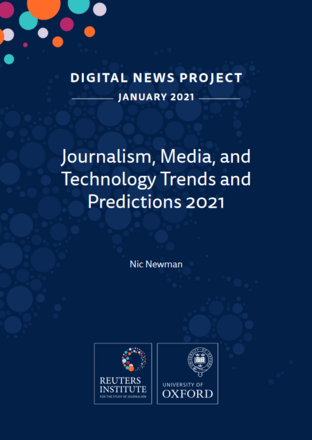
According to the author, who is basing his findings on more than 200 interviews, 2021 will be a year of profound and rapid digital change following the shock delivered by Covid-19. Lockdowns and other restrictions have broken old habits and created new ones, but it is only this year that we’ll discover how fundamental those changes have been.
Covid 19 gave an acceleration to digitalization (Three-quarters (76%) of the sample of editors, CEOs, and digital leaders say Covid-19 has accelerated their plans for digital transition), and though there is optimism on future developments, creating a more innovative culture remains a key preoccupation for many digital leaders.
One need emerged from the survey is the need of refocusing journalism on facts, explanation, and specialism.
From the conclusions:
"The combination of new devices, better connectivity, and increasingly powerful technology holds out the promise of a smarter world where human intelligence is augmented and supported by machines. But it also marks another wave of rapid disruption with potential downsides for many, with much of the underlying technology developed and controlled by a small number of big technology companies. 2021 will not be an end-point in that journey but a year when more of the building blocks fall into place. Journalism’s job – as with the coronavirus crisis – will be to explain the implications for ordinary people, but also to ask searching questions about transparency, control, and how equally the spoils are being shared. At the same time, journalism as a business will need to embrace this moment to complete its own transformation. The pandemic has comprehensively made the case for faster change towards an all-digital future. We’re already seeing the emergence of distributed newsrooms, taking advantage of collaborative online tools to get more reporters out of the office, and offering greater personal flexibility for staff. But newsrooms will also need to innovate in new digital formats if they are to successfully engage audiences on the platforms where they choose to consume the news."
234 people completed a closed survey in December 2020. Participants, drawn from 43 countries, were selected because they held senior positions (editorial, commercial, or product) in traditional or digital-born publishing companies and were responsible for aspects of digital or wider media strategy. Respondents included 52 Editors-in-Chief, 45 CEOs or Managing Directors, and 29 Heads of Digital and came from some of the world’s leading traditional media companies as well as digital-born organisations.
Tags: Digitalisation Digital rights Online news Online mediaThe content of this article can be used according to the terms of Creative Commons: Attribution-NonCommercial 4.0 International (CC BY-NC 4.0) . To do so use the the wording "this article was originally published on the Resource Centre on Media Freedom in Europe" including a direct active link to the original article page.

